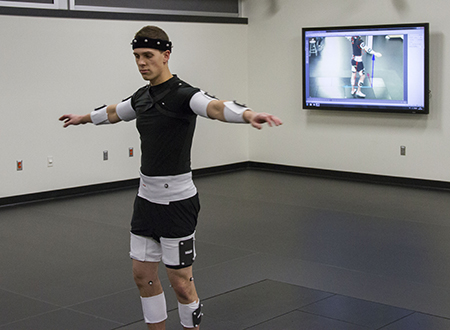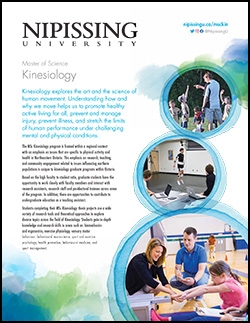














Master of Science in Kinesiology in our School of Graduate Studies
The Master of Science in Kinesiology (MSc) is a thesis-based degree program that offers students an opportunity to train in a world-class facility with state-of-the-art equipment and leading faculty researchers.
Areas of study can include topics broadly related to the natural health and physical sciences, such as biomechanics and ergonomics, exercise and environmental physiology, sensory-movement behaviour, physical activity and health promotion, coaching, and sport psychology. Graduate students are drawn to the School of Physical and Health Education to work with specific research faculty members and benefit from their expertise in specific content areas.
The MSc program operates using a mentor model. The benefits of a mentor model are numerous, including clarification of research and other funding support at time of application and focused supervision from the time of registration. The MSc program prepares graduates for further research training (e.g., doctoral and post-doctoral studies) and a broad range of careers in Kinesiology and related fields, such as medicine, health promotion, rehabilitation, sport, fitness, education, government, and industry.
Program related questions can be directed to the Graduate Coordinator at GradKin@nipissingu.ca
- Program
- Admissions, Applications, and Dates
- Tuition and Funding
- Facilities
- Resources
- Contact Us
- Opportunities
Master of Science in Kinesiology (MScKIN)
- Graduate Admission Requirements
- Program Requirements
- Graduate Studies Program and Degree Requirements
- Available Kinesiology (KINE) Courses
- Complete listing of all courses
The MSc in Kinesiology program a research-intensive, thesis-based program. Full-time students are expected to complete the program within 2 years (6 terms) of their initial enrolment. Flex-time students are expected to complete the program within 4 years (12 terms) of their initial enrolment.
Tuition and Fees
Funding and Financial Aid - Scholarships, Bursaries and Awards
Funding is available to graduate students from both internal and external sources. Internal funding includes teaching/research assistantships, faculty research grants, and Nipissing Graduate Scholarships. The value of these scholarships varies. Students are also encouraged to compete for scholarships from the Social Sciences and Humanities Research Council (SSHRC), the Natural Science and Engineering Research Council (NSERC), the Canadian Institutes of Health Research (CIHR), the Ontario Graduate Scholarships (OGS), the Canada Graduate Scholarship, and the Mackenzie King Memorial Scholarship.

Interested students can expect a research-intensive thesis-based program. Students will have the opportunity to conduct research in Nipissing’s new $7.5 million Centre for Physical Health and Education. The facility features world-class funded labs, including the Sensory-Movement Behaviour Lab, Psychology of Physical Activity and Health Promotion Lab, Biomechanics and Ergonomics Lab, and Exercise Physiology Lab.
Nipissing University not only provides its graduate students with attentive faculty and a supportive community, but also offers physical spaces that are conducive to productive research.
Our graduate students study and teach in state-of-the-art classrooms, seminar rooms, and research labs. Our graduate student lounge and interdisciplinary office provides students with their own dedicated space to meet and collaborate.
The Harris Learning Library was completed in 2011 and provides 56,000 square feet of study space with natural light and a modern award-winning design. The new library features expanded print collections, a learning commons, an adaptive technology area, and collaborative work spaces.
Equipment
Graduate students in the MSc in Kinesiology program will access existing equipment within the PHE labs associated with their respective sub-disciplines (e.g., exercise physiology, biomechanics, psychology of physical activity, motor control) for both coursework and research. Specialized equipment currently available within the labs is listed below:
Exercise Physiology
- Environmental Chamber (-40 to +40 Celsius, Humidity and Altitude control)
- Split-Belt Force-Sensing Treadmill
- Biological Sampling Room (with Blood-Gas Electrolyte Analyzer, Portable Lactate Analyzer Biological Safety Cabinet, Autoclave, Refrigerator and Ultra-Low Freezer)
- Innovision Innocor (Non-invasive Oxygen Consumption, Cardiac Output)
- MedGraphics CPX Ultima (Oxygen Consumption and Metabolic Rate)
- 32 Channel Powerlab Data Acquisition system (ECG, EMG, and other biological signals)
- Spirometers (Lung Function Testing)
- Skin Temperature Sensors
- ISS Oxiplex Near Infrared Spectrometer (Non-invasive Muscle Oxygen Consumption)
- Two Computrainer Velotron Cycle Ergometers
- Trackmaster TMX-425 Treadmill
- Heart Rate monitors, blood pressure devices, etc.)
Biomechanics
- 15-camera Qualisys Oqus 400+ motion capture system with active and passive markers and 64 channel BNC analog to digital interface
- Ascension 3-D Guidance Trakstar electromagnetic motion capture system
- Two Bertec FP-6090 force platforms with analog and digital amplifiers
- Bertec PY6-1000 multi-axial load cell
- Mark-10 advanced ergonomics testing kit
- 16 channel Delsys Trigno wireless EMG system with smart sensors (ECG, electrogoniometers, pressure sensors, etc.)
- 8 channel Delsys Myomonitor I-V EMG system
- Video Cameras
- National instruments analog to digital boards (80 channel and 8 channel) with BNC connector block
Software
- Matlab 2014
- Labview 2013
- Visual 3D V5
- Dartfish Pro Suite
Motor Control
- 16 channel delsys EMG system (CFI)
- Eyelink 1000 binocular eye-tracking system (CFI)
- Optotrak Certus 3D motion capture system (CFI)
- ECG monitoring system
- E-prime software with SR-box
- Superlab software with Cedrus response boxes
- Wacom 2D digitizing tablets
- Translucent technologies liquid crystal goggles
- Drive-Sim Driving Simulator
Psychology of Physical Activity and Health Promotion
- Olympus voice recorders
- Omnitech voice recorder
- Desktop computers
- NOLDUS Observation software program
- SPSS and NVivo software programs
- GearPlayer transcription software and transcription foot pedal
- Sony digital video cameras
- Accelerometers
- Pedometers
- Polar Heart rate monitors
- TrackStick Pro GPS Data Loggers
Graduate students in the MSc program will access the athletic facilities and other on-campus facilities currently available to Nipissing University graduate students as part of their student fees.
Graduate Studies Resources
- Graduate Studies Regulations
- Graduate Studies Procedures
- Graduate Studies Forms
- Graduate Studies Glossary
- Graduate Student Card Application
- Centre for Literacy
Major Research Paper/Thesis Resources
- MRP/Thesis Defence Process
- MRP/Thesis Supervisory and Examination Committees
- MRP/Thesis Final Submission Process
Thesis Proposal and Defence
In order to receive our Master of Science in Kinesiology degree, students must submit and defend a thesis. Click here for more information about the Thesis Proposal and Defence processes.
Supervisory Committee Membership
Each MSc candidate’s Supervisory Committee will be comprised of the supervisor(s) and two additional faculty members. Click here for more information about Supervisory Committee Membership.
Graduate Program Coordinator
- Extension4091EmailWebsite
Graduate Program Faculty
- Extension4280Website
- Extension4295Website
- Extension4069Website
- Extension4068EmailWebsite
- Extension4669
- Professor, Interim Associate Dean, Schulich School of EducationKinesiology, MScExtension4173Website—
- Extension4201Email
- Extension4585EmailWebsite
- Extension4670Website—
- Extension4211EmailWebsite
- Extension4636EmailWebsite—
- Extension4319
- Associate Vice-President, Research, Innovation and Graduate Studies, ProfessorKinesiology, MScExtension4293EmailWebsite
- Extension4470Website—
- Extension—EmailWebsite—
- Extension4815Website
- Extension4187EmailWebsite—
- Extension4449Website—
- Extension4731EmailWebsite—
- Extension4561
- Extension4115EmailWebsite—
- Extension4285Website—
- Extension4126Website—
Adjunct Professor
- Extension—Website
Post-Graduation Opportunities and Careers
With an MSc in Kinesiology, our graduates will be prepared for a broad range of careers as professionals in advanced research positions in Kinesiology and related fields, such as: health promotion, rehabilitation, occupational health and safety, sport, fitness, and education.
Many of our MSc graduates will continue to further education in Kinesiology and other health professions (e.g., PhD, Medicine, Public Health, Physiotherapy, Occupational Therapy) and will achieve advanced qualifications (e.g., Registered Kinesiologist, Certified Professional Ergonomist, Certified Exercise Physiologist, Certified Mental Performance Consultant).


























